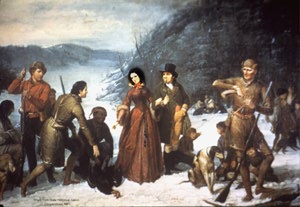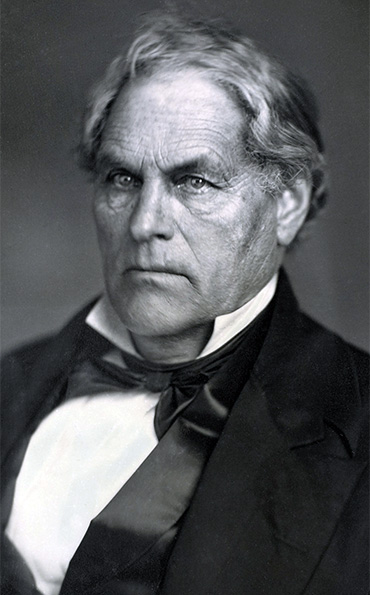 James Fenimore Cooper was the first successful American novelist and the country's first great social critic. In 1790, William and Elizabeth Cooper moved their family from Burlington, New Jersey to Cooperstown, on the shores of Lake Otsego in up-state New York. William was a wealthy landowner and held large tracts of land in Otsego County, NY. James was the youngest of seven — as a child, he enjoyed reading fiction novels and exploring the lake and the surrounding terrain. James would later reference his boyhood home in his novels, with "Lake Glimmerglass" and the town of "Templeton".
James Fenimore Cooper was the first successful American novelist and the country's first great social critic. In 1790, William and Elizabeth Cooper moved their family from Burlington, New Jersey to Cooperstown, on the shores of Lake Otsego in up-state New York. William was a wealthy landowner and held large tracts of land in Otsego County, NY. James was the youngest of seven — as a child, he enjoyed reading fiction novels and exploring the lake and the surrounding terrain. James would later reference his boyhood home in his novels, with "Lake Glimmerglass" and the town of "Templeton".
In 1801, his father sent him to preparatory school in Albany. Being from an extremely well-off family, he was later schooled at Yale, following in the footsteps of his older brother William Jr., who studied at Princeton. James was the youngest in his class (a mere thirteen) and excelled in the study of Latin. He was expelled for "boyish pranks" in 1805. At seventeen, he went to sea, first as a sailor on merchant ships, then for the navy as a midshipman. His experiences in the Navy no doubt inspired him when he wrote the sea tales The Red Rover (1826), The Sea Lions (1849) and The Pilot. Cooper is also credited with practically inventing the sea novel when he published The Pilot in 1824.
When his father died in 1809, the will left $50,000 to each of his sons, equivalent to roughly $5,000,000 a piece in today's dollars. This inheritance soon diminished as faulty land titles, debt, and the general economic recession of 1817-1819 ate away at the wealth. Cooper found time to get married; Susan De Lancey and James were wed in 1811. They split their time between Scarsdale and Otsego. By the mid 1810s, Cooper was settled and had a family. Because of the debt on his father's estate, he was obligated to be self-reliant. He had debts of his own and needed money to support his family. He had not exactly found success as a gentleman farmer, then a frontier landlord and mercantile investor.
 Because of his wife's encouragement and his financial woes, Cooper took to writing. He published his first novel, Precaution, anonymously in 1820, after a casual bet with his wife that he could write a successful novel. Cooper originally took to fiction writing on a whim, rather than a career decision, for no previous American author had been successful. Precaution received little critical praise and did not sell well. His next novel, The Spy (1821), was a bestseller and a critical success. The success of The Spy encouraged Cooper to pursue a full-time career in writing. Spurred by his prosperity, Cooper moved his family to New York City in 1822 to further his career. He soon became a dominant literary figure, nationally and overseas.
Because of his wife's encouragement and his financial woes, Cooper took to writing. He published his first novel, Precaution, anonymously in 1820, after a casual bet with his wife that he could write a successful novel. Cooper originally took to fiction writing on a whim, rather than a career decision, for no previous American author had been successful. Precaution received little critical praise and did not sell well. His next novel, The Spy (1821), was a bestseller and a critical success. The success of The Spy encouraged Cooper to pursue a full-time career in writing. Spurred by his prosperity, Cooper moved his family to New York City in 1822 to further his career. He soon became a dominant literary figure, nationally and overseas.
Two years later, Cooper published The Pioneers, the first of the five Leather-stocking Tales he would write about Natty Bumppo. In The Pioneers, Cooper fictionalized his childhood memories and the village of Cooperstown; he called the imaginary place "Templeton", a village on the shores of "Lake Glimmerglass." Wrote in the wake of his father's estate's collapse, The Pioneers tries to reclaim Cooper's lost inheritance. He wrote it primarily to reassert his family's claims to preeminence. He succeeded in not only this, but in proving to the world and to Europe that American fiction has arrived. Both The Pioneers and The Spy persuaded American readers that at last their country had produced a novelist who could refute the British scoff that "no one bothered to read an American book". The success of Cooper's novels reassured anxious publishers, painters and writers that there was a market for American arts and literature. Most of the cultural elite considered Cooper, not merely as a successful novelist, but as their great champion in a struggle for domestic self-respect and for international regard; he proved to Europe that America was an artistic force to be reckoned with. He was suddenly rivaling Europe's celebrated Sir Walter Scott; Victor Hugo believed his was better than Scott.
With the publication of The Spy and The Pioneers, Cooper became the first American novelist to portray the American experience. Critic T.W. Higginson dubbed this the "..daring Americanism of subject." The American public was also ready for Cooper — The Pioneers had first day sales of 3,500 copies, an unprecedented amount in those days. Cooper gave the country literary respectability — he became the American novelist, single-handedly creating two important genres — the sea romance and the frontier adventure story. Alan Taylor describes Cooper's novels as "…freighted with patriotic significance as vindications of the New Republic's cultural worth and potential." In other words, America had proven herself.
In 1826, shortly after publishing The Last of the Mohicans, Cooper sailed to Europe, where he lived for seven years. But he kept busy writing, churning out The Prairie in 1827 and Notions of the Americans in 1828. He then wrote three historical novels before returning to the Americas in 1933. After his tenure in Europe, the American press turned against him – much of his time and energy was spent fending off their jabs and defending himself in lawsuits. Cooper began to write social and political satires after his experience with the press. He also found time to add two more Leather-Stocking Tales — The Pathfinder in 1840 and The Deerslayer in 1841. His History of the Navy of the United States of America in 1839 found himself in even more legal trouble.
 Cooper is most famous for his Leather-Stocking Tales (i.e. the Adventures of Natty Bumppo). The Saga consists of five novels, The Pioneers (1823), The Last of the Mohicans (1826), The Prairie (1827), The Pathfinder (1840) and The Deerslayer (1841). Natty Bumppo, the principle character in all five novels, is a wild, white frontiersman, brought up primarily by the Delaware Indians of present day up-state New York. Known in the Saga as Hawkeye, Leatherstocking, Pathfinder and Deerslayer, Natty has been called a moral hermaphrodite for his dual background of white birth and education and his long experience of life with the Indians. Balzac affectionately calls Natty "a child of savagery and of civilization." With this advantage, Natty often acted as an interpreter or a go-between for the whites and the reds.
Cooper is most famous for his Leather-Stocking Tales (i.e. the Adventures of Natty Bumppo). The Saga consists of five novels, The Pioneers (1823), The Last of the Mohicans (1826), The Prairie (1827), The Pathfinder (1840) and The Deerslayer (1841). Natty Bumppo, the principle character in all five novels, is a wild, white frontiersman, brought up primarily by the Delaware Indians of present day up-state New York. Known in the Saga as Hawkeye, Leatherstocking, Pathfinder and Deerslayer, Natty has been called a moral hermaphrodite for his dual background of white birth and education and his long experience of life with the Indians. Balzac affectionately calls Natty "a child of savagery and of civilization." With this advantage, Natty often acted as an interpreter or a go-between for the whites and the reds.
Cooper had the gall to create Indian characters with redeeming, human qualities, something that hadn't been done by white authors. At the time, the majority of white Americans were not willing to recognize Indians as "civilized" or "human", yet Cooper was truly an innovator in this respect. Unfairly, Cooper was criticized for creating the "noble red man." But not all of Cooper's Indian characters were "civilized". In The Last of the Mohicans, a group of savage Indians kidnap two white sisters. These Indians become the antagonists of the story; we are led to hate not only their motive but their tribe as well. An in-depth analysis of Cooper's portrayal of Indians.
Throughout the Leather-Stocking Tales, Natty is constantly at struggle with the Iroquois Indians and rescues women like clockwork. In The Deerslayer, Natty escorts the Hutter sisters to safety, braving the scalpers. Subsequently, he leads another set of sisters to safety in The Last of the Mohicans, the Munro sisters. In The Pathfinder, Natty, now in his fifties, heads west toward Lake Ontario and works as a scout for British troops. This time, he happens to rescue another woman from the Indians, Mabel Dunham. In The Pioneers, Natty is reunited with an old Indian friend, Chingachgook. By now, the two are in their seventies (Cooper did not write the Saga in strict chronological order); Chingachgook dies of old age, possibly symbolic of the disappearance of American Indians from the frontier, or the disappearance of the American frontier itself. Natty doesn't fail in his rescuing duties and manages to save yet another woman, once from a panther and then again from a fire.
Natty Bumppo was aware of the conflicts between the established laws of nature and the social laws of property and government. In order to keep the freedom he desired, he had no choice but to move west, which he did in The Prairie. He was later taken in by a peaceable tribe of Pawnee Indians and lived with them until his death.
Natty Bumppo can be called the ideal individualist. He was incredibly self-reliant and an honorable hero. The Cambridge History of American Literature calls Natty Bumppo, "the most memorable character American fiction has given to the world." – a great honor, indeed. To Cooper, Natty could have been an alter ego; a character that possessed qualities that he himself strived for — qualities such as courage, loyalty, or individualism. Many assume that Cooper was describing himself in Natty, but this is not the case. Cooper was an elitist, a "gentleman", who was probably lacking in many of Natty's better qualities.
 Although much praise was given to Natty Bumppo, Cooper himself was not as lucky. A frequent complaint against Cooper's writing was that the incidents and characters were improbable. Mark Twain criticized Cooper rather unfairly in his Fenimore Cooper's Literary Offenses, criticizing the improbabilities, exaggerations and stilted language of the Leather-Stocking Tales. He pegs Cooper for being inaccurate in his observations and inconsistent in his dialog. Let it be known that Twain also took passages out of context; the Leather-Stocking Tales are really better than Twain would lead you to believe. In addition, it has been said that Cooper's English was Latinized and thus, verbose. Twain's English, on the other hand, was more direct, unadorned and obviously Anglo-based.
Although much praise was given to Natty Bumppo, Cooper himself was not as lucky. A frequent complaint against Cooper's writing was that the incidents and characters were improbable. Mark Twain criticized Cooper rather unfairly in his Fenimore Cooper's Literary Offenses, criticizing the improbabilities, exaggerations and stilted language of the Leather-Stocking Tales. He pegs Cooper for being inaccurate in his observations and inconsistent in his dialog. Let it be known that Twain also took passages out of context; the Leather-Stocking Tales are really better than Twain would lead you to believe. In addition, it has been said that Cooper's English was Latinized and thus, verbose. Twain's English, on the other hand, was more direct, unadorned and obviously Anglo-based.
Critic William Gilmore Simms found that Cooper lacked unity. "Conceiving some few scenes or even a single one with great beauty and boldness, he discards from his mind all serious concern for the rest." Critic John Neal Severly condemned Cooper for lacking the courage to record events as is. In other words, to succinctly and comprehensively describe the given scene. Twain also noted this of Cooper.
What most appeals to readers are his ambivalent dramatizations of American conflicts such as natural right vs. legal right, order vs. change ad primeval wilderness vs. civilization. Cooper's Leather-Stocking Tales remained throughout his lifetime and into the 20th Century. Major European authors such as Balzac and Tolstoy praised his works. Herman Melville and Joseph Conrad were greatly influenced by him; the latter even calling Cooper a "rare artist." British author D. H. Lawrence calls Cooper simply "the American novelist."
Cooper was a "lifelong defender" of American democracy against European aristocracy and what American democracy had digressed to. His The American Democracy in 1838 was reactionary in that it was critical of what American democracy had become. In publishing this book, Cooper came under attack as a nonbeliever in democracy. But nothing could be further from the truth. Cooper lauded democracy, especially how it originally existed in the United States. He held the opinion that democracy in America was digressing and its citizens were slowly losing the freedoms they had recently fought so hard for.
But Cooper had obvious flaws — syntactical awkwardness, arbitrary plotting and unsuccessful "attempts" at humor. Some of his opinions seem incredibly outdated now, but were probably held by a great number of Americans during his time period. For instance, Cooper defends the legality of American slavery and deplores universal suffrage. He also expounds on the benefits of restricting voting rights on certain issues to property owners, who "have the greater stake in society."
By the time Cooper died in 1851, he was considered to be America's "national novelist." Cooper wrote successfully because he possessed an ordered concept of life. He found it so fulfilling because it satisfied his deep hunger for public influence and power. Unable to replicate his father's success as a politician, judge and developer, Cooper found his own prestige as a popular novelist and literary spokesman for the nation. His novels dealt with such issues as individualism, revenge, courage, respect, war, love, and loss, but most importantly they dealt with America and the American experience.
Related articles
Works Cited
Baym, Nina. The Norton Anthology of American Literature. New York: W.W. Norton & Co., 1999.
The Cambridge History of American Literature. Cambridge: Cambridge University Press.
Cooper, James Fenimore.  The Last of the Mohicans. New York: Bantam Books, 1981, [1826].
The Last of the Mohicans. New York: Bantam Books, 1981, [1826].
Grossman, James. James Fenimore Cooper. Stanford, CA: Stanford University Press, 1967.
Guthrie, Jr., A.B. Introduction to The Last of the Mohicans. New York: Bantam Books, 1981.
Internet Public Library, The. "Online Literary Criticism Collection" Accessed 16 July 2007.
State University College at Oneonta. "Links" Accessed 16 July 2007.
Taylor, Alan. Fenimore Cooper's America. History Today, 1996.
Taylor, Alan.  William Cooper's Town: Power and persuasion on the frontier of the early American republic. New York: A.A. Knopf, 1995.
William Cooper's Town: Power and persuasion on the frontier of the early American republic. New York: A.A. Knopf, 1995.
Twain, Mark. "Fenimore Cooper's Literary Offences".
Walker, Warrens. James Fenimore Cooper: an introduction and interpretation. New York: Barnes & Noble, 1962.